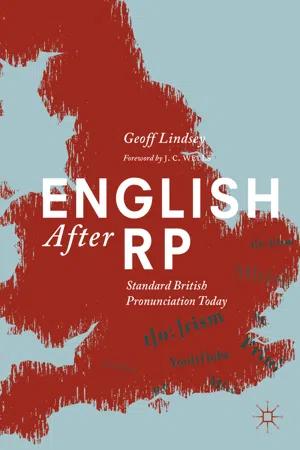During the nineteenth century , literacy in Britain rose from around 50% of the population to nearly 100%. Reading became increasingly popular among the general public. There was therefore an increasing familiarity with words in their written forms – which, in English, are often quite different from their pronunciations.
As many people believed written forms to have greater authority than spoken forms, many pronunciations which had drifted away from their spelling over the years were brought back into line with it by writing-conscious speakers. The more educated may often have considered popular ‘spelling pronunciations’ to be mistakes. But, especially as society became more democratic, the majority pronunciation tended to become accepted as standard.
Numerous instances date from the RP era, such as the shift of
towards from one-syllable /tɔːdz/ to two-syllable /təˈwɔːdz/. The process has continued to the present day: the Mini Dictionary at the end of this book contains a number of words which in RP had pronunciations relatively distant from their written forms, but which have been shifted closer towards the spelling. Examples:
ate
handkerchief
hurricane
interest
mayor
mosquito
nephew
often
portrait
In writing, compound words generally preserve the written forms of their component parts, even though the pronunciation may not be the same. For example, man is pronounced /mən/ in postman. Awareness of written forms may promote a feeling that such forms should be pronounced in the ‘original’ way: some compounds have changed since RP to make one of the components more like its independent pronunciation. Examples are bedroom, newspaper, and Monday and the other days of the week, which exhibit shifts to match the independent words room, news and day.
Not all changes have been in the direction of the spelling, however: some words, such February and library, have shifted away from their written forms (see the Mini Dictionary).
A word may be pulled in conflicting directions. The first vowel of dissect has shifted from the KIT vowel to the PRICE vowel under the influence of other words beginning di-, such as dichotomy and digress, despite the fact that the written double ss generally requires a preceding KIT vowel, as in dissertation.
America exerts powerful cultural influence on the rest of the world. Within the English-speaking world, this includes aspects of pronunciation. Although direct cause and effect are hard to establish, many of the changes described in this book bring the pronunciations of most or many British speakers closer to those of American speakers.
Such changes include weak vowel merger (Chap. 10), yod coalescence in unstressed syllables (Chap. 15), the strengthening of some endings (Chap. 23), leftward stress shifts (Chap. 24), voicing of the fricative in words ending -rsion, and the pronunciation of some individual words like ate, debris, exit, gotten, harass and mayor (see the Mini Dictionary). Some recent phonetic developments are ones that are more established in America, like Uptalk (Chap. 31) and vocal fry (Chap. 27).
Nonetheless, SSB still retains its chief non-American characteristics, such as a distinct LOT vowel (Chap. 7), relatively little /t/-voicing (Chap. 19), and non-rhoticity (Chaps. 20 and 25). And some words have tended to become less like the American pronunciation than they were in RP, such as contribute, controversy and garage (see the Mini Dictionary). The Southern British enthusiasm for the Fall-Rise tone has probably increased (Chaps. 29 and 30). And the new popularity of TH-fronting in Britain (Chap. 22) is not matched in America.
Probably the greatest area of American influence is one that receives little attention in this book: the use of words, phrases and idioms. Many British speakers today make frequent use of words that not long ago seemed disti...
